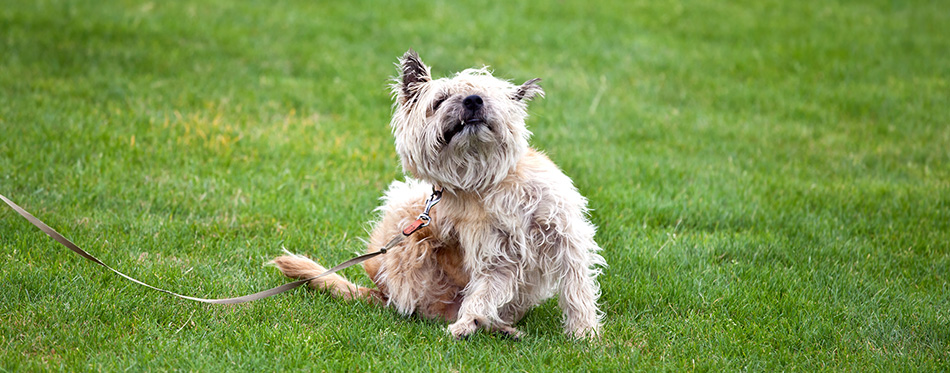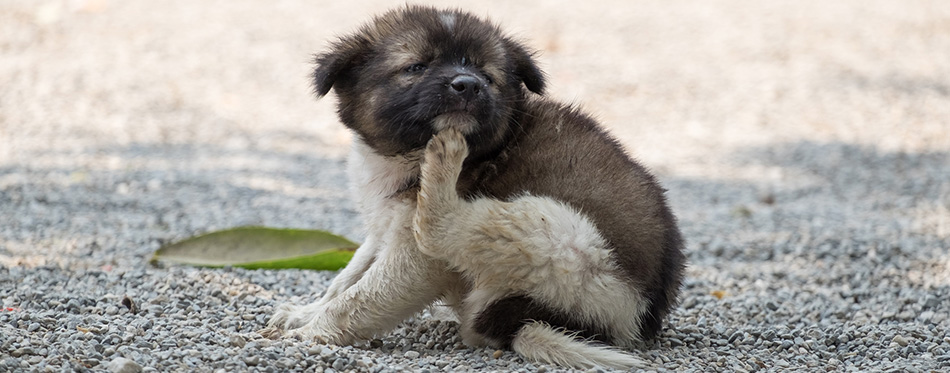It is fairly common to see dogs of all breeds and ages scratch. As dog owners and lovers, we tend to write it off as just a characteristic of the animals themselves. However, sometimes constant scratching can be more serious than that and down to an issue that needs to be addressed.
Many of us will therefore be asking how can I get my dog to stop scratching and be looking around for remedies to help our itchy pups. In this guide to ‘why does my dog keep on scratching’ we look at solutions to help our canine friends stop causing themselves any discomfort once we have identified the reason behind their chronic itching.

Why Dogs May Be Scratching
There are a whole host of reasons why dogs may keep on scratching. It is good to be aware of all of them so that you can apply the proper remedy and treatment, or know when is best to take your dog to see a vet or pet healthcare professional.
Boredom, Stress or Anxiety
This can be quite a difficult symptom to diagnose, but dogs do often simply scratch out of nerves or sometimes simply because they are bored. It sounds odd as it looks so painful to us, and we cannot imagine how scratching would alleviate any anxiety, but some humans are prone to biting their nails or playing with their hair when nervous. However, scratching is a way that dogs exhibit their nerves and it can sometimes develop into a similar OCD type behavior too. The nervous reaction can simply become a bad habit.
This is especially the case if your dog is scratching if he or she is bored. While some dogs display boredom through eating shoes and biting furniture, some most definitely scratch for something to do. This type of behavior is perhaps only ever conducted when you are therefore out of the house, but you can see once you have returned where your dog has scratched some of him or herself raw in places.
Allergies
Dogs are just like humans in some senses because they can also suffer from allergies that can exacerbate an issue with their skin to cause scratching. Just think of the amount of eczema sufferers you know that have to cut out dairy or wheat. The same is with dogs.
However, while dogs are less prone to dietary allergic reactions, often owing to the limited diet that we give them, they can still have itching made worse by things surrounding them. This means that in the height of Summer, when pollen is at its worse, you may find that this is when your dog scratches a great deal more. Additionally, if your house suffers a little bit from damp, and therefore mold as a consequence, it could be the mold that is affecting your dog and causes him or her to itch so much. Dog itching after a bath is also incredibly common.
Dry Skin
Dogs can suffer just as much from dry skin as we do, despite having fur to cover their bodies from their nose to their paw pads. Again, this can be down to environmental factors like the cold. Biting wind, rain and snow can all wreak havoc on a dog’s fur coat and the balance of oils he or she produces to protect it.
Dry skin can also be caused by fatty acid deficiencies, which can be difficult to diagnose. The first step in doing so however is simply to identify that your dog is suffering from dry skin in the first place. This looks much like dry skin on our bodies would, only it will start to flake off into their fur and look like dandruff. Ironically, it can therefore be easier to spot a dog’s dry skin if he or she has a big furry coat as opposed to a body covered in short hair. This is because dandruff is caught by the shaggy coats and it becomes easier to spot. On short haired dogs, it is likely simply to fly away.
If you notice your dog scratching therefore, try to investigate the spot they have just scratched when they stop, or better still when you stop them scratching. If the skin looks pink and dry, and you do not think that it is caused by the weather, ask your vet for advice.

Pain
We are often quick to jump to the wrong assumptions when we notice a dog scratching. We therefore often feel that their scratching is down to something far more serious and sinister than sometimes is often the case. Quite simply, there could be something stuck in his skin that is causing him pain. If, you notice your dog licking or chewing at its skin a great deal as well as scratching, really try to examine the area for any thorns or otherwise that could have become stuck there – especially around the paws.
However, while excessive scratching can simply be pain from something sticking into them, it actually can be far more serious too. Your dog could be suffering from orthopedic issues. This means that they could be suffering from conditions like arthritis or even hip dysplasia. As the owner, you will need to inspect the area he or she keeps chronically itching for any external aggravations before then taking him or her to the vet for a more in depth consultation. Hopefully, at the end of such a consultation your vet will be able to discredit such a condition as a cause behind the itching, but it is best to go for a definitive diagnosis just in case.
Hormones
Hormonal imbalances are a huge reason why dogs like to scratch so much. They occur because your dog’s body is not doing as it should and producing the correct levels of thyroid hormones or cortisol hormones. For scratching to occur, it means that the body is not making enough of the thyroid hormone and producing far too big an amount of cortisol. This then encourages skin infections to develop.
They will often start in a superficial way, but through scratching they can be made far worse. For this reason, if you notice bald spots, try to be as quick as as possible in treating your dog’s hormonal imbalance. Skin infections can start as something that is easily treatable but can soon turn into far worse and far more pain for your dog if not caught quickly enough.
Parasites
Parasites are perhaps the biggest reason why dogs will be compelled to scratch parts of their body repeatedly until their skin is raw. Common and well known parasites include fleas, but mites can also be a reason as well as ticks. Ticks in particular need to be seen to immediately if they are the parasite behind causing your dog to scratch so much. They carry disease and can infect your dog if they are left on the skin for too long. They start very small, which is a problem in identifying them in the first instance, but they get bigger as they start to take in more of your dog’s blood.
Fleas are quite difficult to see too, but when the infestation gets big enough, they become noticeable to the naked human eye. Mites are very hard to identify as they require a microscope to be seen. For them to be identified as the reason behind your dog’s scratching, both ticks and fleas have to be eliminated as the initial cause.
You may also like our articles on Flea Treatment for Dogs, Flea Collar for Dogs and Flea Carpet Powder.
Healing Wound
When a wound is healing on the skin, it becomes itchy. Dogs can therefore be very susceptible to having a wound that takes a long time to get better as they do not allow that wound to heal up by scratching it every time it feels itchy. What is difficult about identifying this problem as the root cause of your dog’s itching is that often dogs are so noble if they have cut themselves that we do not know it has ever happened. Their fur covers it up so that we do not see the wound in the first instance.
However, when this is the case, all that is needed is for the owner to inspect the area where the dog seems to be itching repeatedly for it to be seen so that the owner can then take the necessary course of action to solve the problem.
Check out our guide on Liquid Bandage for Dogs for more info.

How Can I Get My Dog to Stop Scratching: Remedies to Help Your Itchy Dog
Here are the most common ways to solve the problems that could be causing your dog to scratch so much. While many can be adopted at home, it is still best to check with your dog’s vet before you embark on any home remedies so as not to inadvertently cause your dog any more discomfort.
Get Rid of Parasites
When dogs have fleas, mites or ticks, there are a number of ways we can help – not only to ensure that they have the right course of treatment, but also to minimize the likelihood of it happening again. In terms of direct treatment, your vet will be able to prescribe what they believe to be the best flea medicine for your dog. Many will take care of any pesky mites too. For ticks, you need to feel all of your dog’s body for any lumps, and then remove the tick if that is what is causing the inflammation. Tick removers are small tools that are readily available in most pet stores. However, you can help in the removal by covering the tick in petroleum jelly which suffocates the tick so its teeth loosen their grip on your dog’s fur.
If it is a flea problem your dog suffered from, remember to hoover regularly around the house (including all padded furniture) and wash your dog’s bed as often as possible. Additionally, wash your dog with a good dog shampoo as regularly as you can and even think about moisturizing their skin with coconut oil. Coconut oil can also be a great ointment to add to wounds or dry skin directly, or even add to a bath’s water for its moisturizing and antibacterial properties.
Modify Their Diet
This solution can often work wonders, but it does take time to see the benefits. However, try to eliminate a number of ingredients from your dog’s diet at first. Then, start slowly adding different ingredients and foods back in to see if that causes your dog to begin their chronic scratching again. Beef, not wheat, can often be the most common reason behind scratching that is caused by a food allergy. You may also want to think about adding some dietary aids to your dog’s food that will promote a healthy coat as well as healthy skin.
Use Medication
If a dog has a hot spot, or a skin infection, often the only thing that will help solve the problem is to go to the vet and have them prescribe a course of antibiotics. Vets can also give your dog steroids and anti itch products that can really take away their urge to scratch.
Alleviate Boredom and Anxiety
Alleviating boredom is certainly the easier of these two problems. All that owners need to do is lengthen their daily walks slightly and see if that makes a difference. Also playing with them regularly or giving them a dog toy to play with can make a huge impact on the amount they scratch. Sometimes just a good cuddle and some love and affection will go a long way too.
In terms of anxiety, positive association training can really help. When your dog is calm, praise him or her with treats or love, which will often help them get over their fears. Separation anxiety can also be relieved in the same way as boredom. Remember to make your leaving the house a positive event in your dog’s life by giving them their favorite toy as you leave home.
Break Their Habits
Breaking a dog’s scratching habit can be hard as they will have grown so used to it over a period of time. However, as it can cause skin infections it is important to try to break the cycle. Bitter tasting sprays are a great way to stop them compulsively licking, which often goes hand in hand with over scratching, but specialized collars can also work wonders. When you are not around your dog to stop them physically from scratching, think about buying a pair of dog boots to put on them when you are out of the home.

If Your Dog Always Scratching: The Bottom Line
Seeing a dog repeatedly scratch themselves can be upsetting as often it is a symptom of a greater cause of distress. Identifying why your dog is scratching is imperative therefore, but it should not be hard. Simply inspect the relevant areas as soon as possible to ascertain any aggravating reasons behind your dog’s behavior. Then, by working with your vet, work towards eliminating that reason completely to stop your dog from always scratching.

